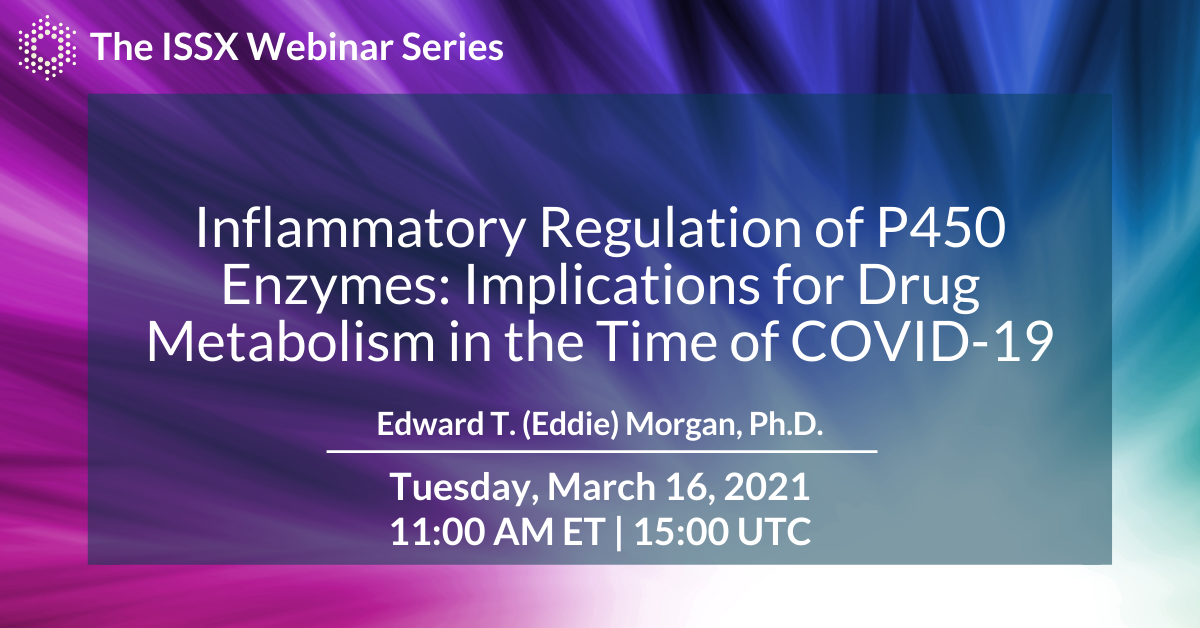
Inflammatory Regulation of P450 Enzymes Implications for Drug Metabolism in the Time of COVID-19 | Dr. Edward T. Morgan
-
Register
- Non-member - $49
- Member - Free!
- Student - Free!
- Premier - Free!
In the 1970s-80s, studies in rats and mice showed that various inflammatory stimuli or live bacterial or viral infections could reduce the capacity of microsomes from affected animals to metabolize prototypic cytochrome P450 drug substrates. With the advent of techniques able to measure specific P450 gene products, we learned that many of these effects are associated with selective down-regulation (suppression) of cytochrome P450 gene transcription. Studies in cultured hepatocytes identified pro-inflammatory cytokines such as interleukin-6 and tumor necrosis factor-a as principal effectors of these changes. Cytokines were found to regulate P450 expression in an enzyme-selective and species-specific manner, suggesting that in vivo responses would be different in different inflammatory diseases. We also learned that drug transporters and Phase 2 drug metabolizing enzymes are subject to the same modes of regulation. In this webinar, we will review the data supporting these conclusions and the evidence that both acute and chronic inflammation significantly impact upon human drug metabolism in a variety of inflammatory disease scenarios including infections, cancer, rheumatoid arthritis and surgeries. We will also discuss the roles of nitric oxide in both inhibiting and down-regulating P450 enzymes under such conditions. Finally, we will explore the possible implications of this inflammatory regulation for the metabolism of cytochrome P450 drug substrates administered to patients with SARS-CoV-2 infections, particularly in the context of the “cytokine storm” reactions that some serious cases experience.

Edward Morgan
Inflammatory Regulation of P450 Enzymes: Implications for Drug Metabolism in the Time of COVID-19
Edward T. (Eddie) Morgan is Professor and Vice Chair for Academic Affairs in the Department of Pharmacology and Chemical Biology at Emory University School of Medicine in Atlanta GA. Born in Millport, Scotland, he earned a Ph.D. in Pharmacology from the University of Glasgow. As a Postdoctoral Fellow with Jud Coon at the University of Michigan, Eddie teamed with Dennis Koop to identify, purify and characterize a novel ethanol-induced P450 protein, CYP2E1. He then moved to the Karolinska Institute as a Visiting Scientist with Jan-ke Gustafsson. They were the first to conclusively demonstrate that expression of sex-specific forms of cytochrome P450 in rodents are regulated by the pulsatile pattern of growth hormone secretion. Dr. Morgan has a long career of studying the regulation of cytochrome P450 enzymes by inflammatory stimuli, as well as the underlying mechanisms. His current research is focused on developing methods to annotate the human xenobiotic metabolome. Eddie is a former President of the American Society of Pharmacology and Experimental Therapeutics (ASPET) and a long-standing member of ISSX. He was the Editor in Chief of Drug Metabolism and Disposition from 2012 to 2017 and is a former Associate Editor of Molecular Pharmacology. Dr. Morgan has long-standing commitment to graduate student training, and to increasing diversity and inclusion in the STEM disciplines. He is currently a principal investigator in of Emory's NIH-funded Initiative for Maximizing Student Development (IMSD) program, and President and founding member of the Atlanta Society of Mentors.
